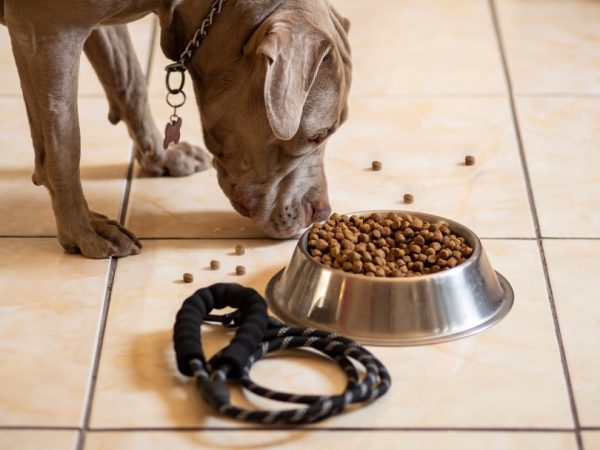In this article
Castor oil is a natural substance that was used as far back as 4000 BC for medicinal purposes. It is an old remedy for constipation in dogs. Although it’s okay to use under explicit directions from your vet, we don’t recommend castor oil as a first-line treatment for any ailments.
The risks of giving castor oil without veterinary advice outweigh the benefits in most cases. Read on to learn more about the historic use of castor oil, the risky side effects, and safer alternatives for your dog.

What is Castor Oil?
Castor oil is made by cold-pressing castor beans from the castor oil plant (Ricinus communis). Castor beans in their natural form are highly toxic to dogs due to the ricin content, which causes illness within 12–48 hours of ingestion.1
Castor oil doesn’t contain ricin since it is removed and deactivated during processing. It is composed mainly of ricinoleic acid, which is responsible for its efficacy as a cathartic agent. Only food-grade castor oil produced by reliable manufacturers should be used medicinally. It should be stored in a cool, dry place and used before the expiration date.
Castor oil is an outdated remedy for constipation in dogs, but it has been shown to stimulate peristalsis of the colon, leading to defecation.2 Think of peristalsis as a stadium wave of colon muscle contraction; the contraction moves along the colon to guide feces toward the exit.
Due to the bitter taste and side effects, castor oil has fallen out of favor in veterinary medicine, with preference being given to other, less noxious laxatives. There is little evidence for other uses of castor oil in dogs or people.
Despite that, it is sometimes used as a topical remedy for minor skin wounds or irritations. In people, it may be used as an alternative treatment for arthritis, headaches, menstrual cramps, labor induction, or dry eye; however, these uses aren’t supported in dogs.

How Is Castor Oil Given?
Castor oil is a liquid that can be drawn up with a medication syringe. With veterinarian approval, you can give castor oil orally. The best way to do this is to mix the castor oil with wet food.
The dose and frequency can be adjusted to produce the desired effects in your dog, but we recommend starting with small doses, especially in smaller dogs. Your veterinarian can advise you how much castor oil is appropriate for your dog, but a general guide can also be found here.
For topical use, you can make a castor oil pack to place on your dog.3 We don’t recommend using external heat on the castor oil pack, as your dog won’t be able to tell you if they are getting burnt by it. You should also start with just a drop of castor oil on the skin and monitor for allergic reactions before using a castor oil pack.
What Happens if You Miss a Dose?
If you miss a dose of castor oil, your dog will not be harmed, besides the reduced laxative effects. You should only use castor oil under the instructions of your veterinarian. If you miss a dose, contact your veterinarian for advice regarding the next dose.
If you need to speak with a vet but can't get to one, head over to PangoVet. It's our online service where you can talk to a vet online and get the advice you need for your dog — all at an affordable price!
Potential Side Effects of Castor Oil
Castor oil has a horrible taste and aftertaste. For this reason, it can be hard to administer to animals. When it’s syringed directly into dogs’ mouths, there is a risk that they may inhale the oil, leading to aspiration pneumonia, which can be severe and life-threatening.
Castor oil ingestion can cause vomiting and diarrhea, especially in larger doses. Vomiting and diarrhea can lead to dehydration and electrolyte imbalances, which can make dogs very sick. In cases of gastrointestinal obstructions, perforations, and inflammatory bowel disease, using castor oil may make things worse for your dog.
Humans using oral castor oil report abdominal pain and dizziness. Castor oil is thought to stimulate uterine contractions, so it’s not safe during pregnancy. It is unknown if castor oil enters breast milk when it’s used during lactation, so it’s not recommended during breastfeeding. For safety, it’s best to follow these human recommendations in canines.
Using castor oil in dogs can lead to them licking it off their skin and potentially have side effects similar to those when used orally. The more they’ve eaten, the greater their risk of side effects. There is also some evidence of castor oil causing an allergic reaction when used on sensitive people and dogs.4


Frequently Asked Questions (FAQ)
How Can I Treat My Dog for Constipation?
Dogs can be constipated due to their diet, underlying illnesses, dehydration, obesity, and lack of exercise. Your veterinarian should be the first point of call to diagnose and treat your dog.
In severe cases, constipation can cause abdominal pain, vomiting, and dehydration, which can make them very sick and necessitate veterinary treatment. However, if your dog hasn’t defecated for 24 hours, is not straining, and is otherwise well, sometimes natural fiber can help them.
Boiled pumpkin and psyllium husk are good sources of fiber for dogs. You can also purchase over-the-counter laxatives which are safe to use as directed on the label.
Does Castor Oil Shrink Tumors?
Castor oil has not been shown to shrink tumors. Castor oil is a possible anti-inflammatory, which means the inflammation around a tumor might settle with castor oil application. However, this effect does not correspond to the suppression of cancer cells, which can spread and harm your dog.
We recommend all possible tumors be examined and treated by a veterinarian. Timely removal of cancers can save your dog’s life.

What Oils Are Best for Dog’s Skin?
Omega-3 fatty acids have an anti-inflammatory effect on the skin. They are present in high quantities in fish oils. For dogs with dandruff, supplementing an omega-6 fatty acid, like those found in corn and evening primrose oil, can sometimes be helpful.

Final Thoughts
Castor oil is mainly used as a laxative, as its main component, ricinoleic acid, acts on the intestines to promote peristaltic movement. However, when used inappropriately, castor oil can have severe side effects, including vomiting, diarrhea, aspiration pneumonia, worsening disease, and abortion.
Topically, it can also lead to allergic reactions. Since there are safer laxatives available, and the use of castor oil for anything other than specific constipation cases is unproven, we recommend only using castor oil under veterinary supervision.
Featured Image Credit: Alexander Ruiz Acevedo, Shutterstock




















